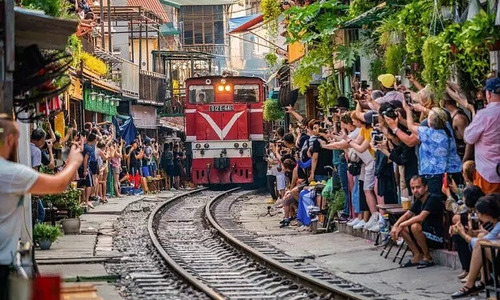
With the year drawing to a close, travel enthusiasts around the world have drawn up numerous holiday plans for 2020. Tuning with the trend, U.S. travel site Fodor's earlier this week released its annual "No List," highlighting destinations travelers should consider giving a skip.
Included on the list, Hanoi Train Street refers to a section of railway track in the capital's Old Quarter, stretched between Dien Bien Phu and Phung Hung streets, and situated only a few feet from nearby houses.
"Overcrowding has caused trains to get stuck and be rerouted. As a result, local authorities have ordered track-side cafes to close and posted signs advising against photo and video shooting," Fodor’s said.
"Because the tracks remain operational, they come with a dangerous price," the site added.
The line was constructed by the French, who used it to transport goods and people across Vietnam, then part of Indochina, alongside Laos and Cambodia, over 100 years ago. Today, the original meter-gauge tracks are still a regular mode of commute among locals and tourists.
In recent years, cafés had opened along the tracks to serve tourists who enjoyed their drinks in close proximity to passing trains. The boom in visitors prompted the Vietnamese government to close down track-side cafés and impose barriers at junctions in October.
Hurt by the loss of their livelihoods, café owners petitioned authorities to let their business continue, promising to comply with strict safety measures. However, authorities in Hoan Kiem District turned down their request on safety concerns.
Recently, U.S. travel magazine Insider listed Hanoi Train Street among its top eight destinations to experience over-tourism in the last decade.
Fodor’s "No List" also included popular destinations including Barcelona in Spain, UNESCO heritage site Angkor Wat in Cambodia, as well as Bali and Komodo islands in Indonesia.


















